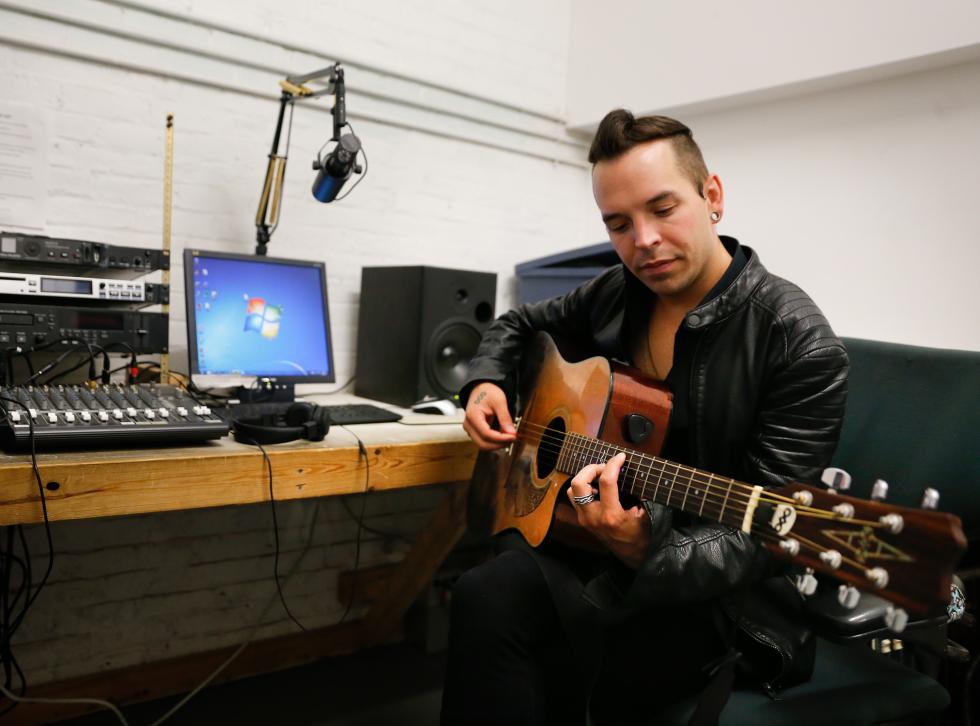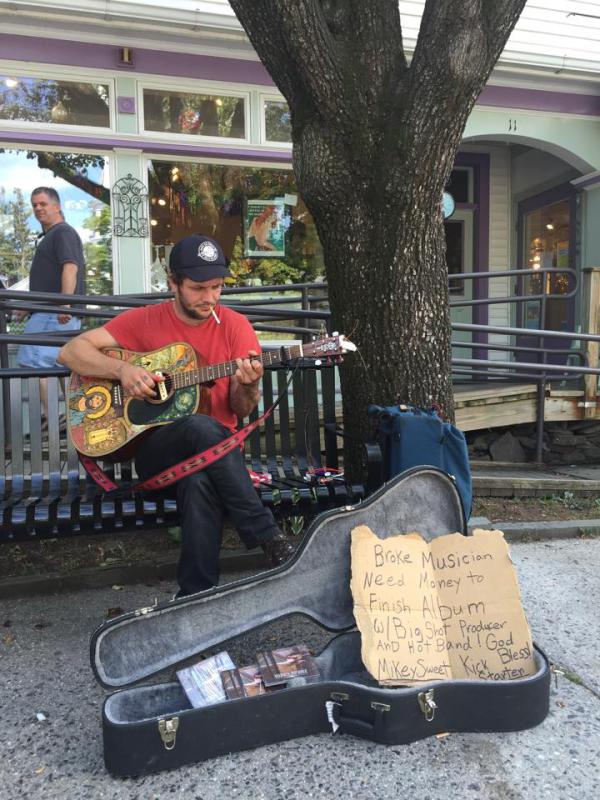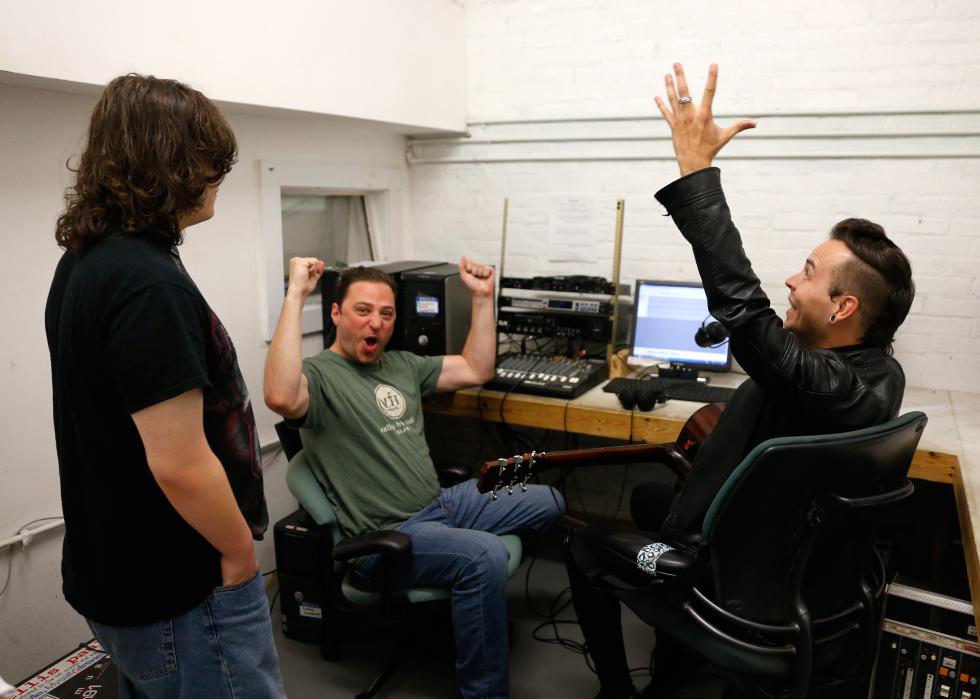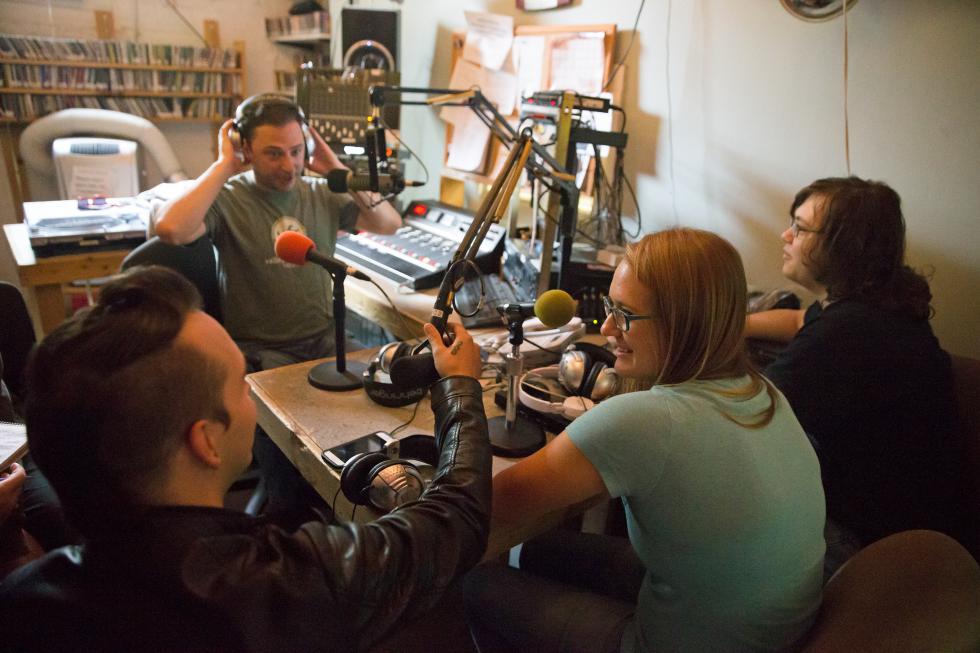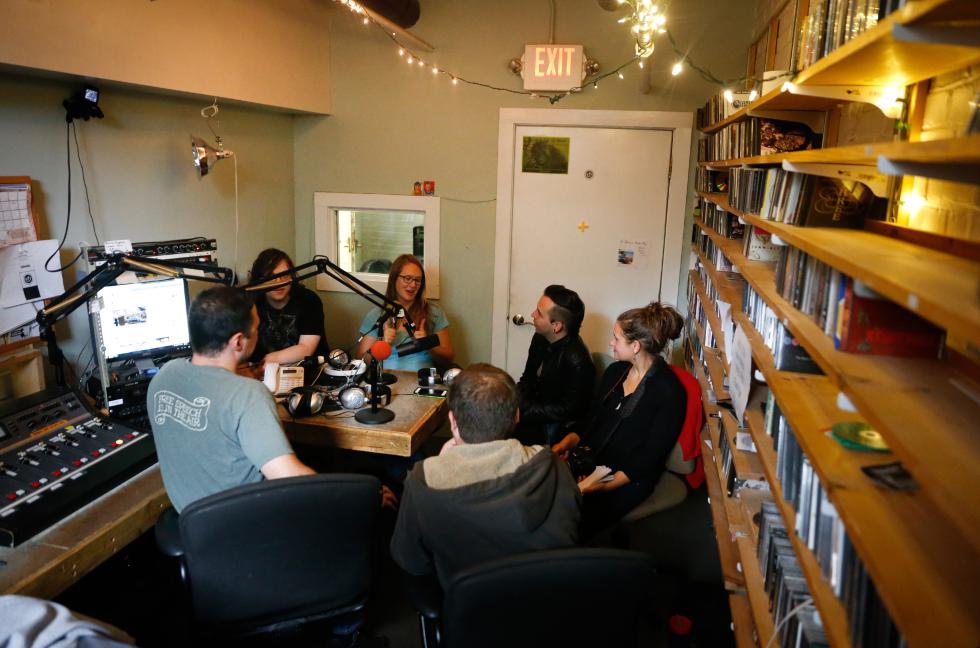Valley musician Mikey Sweet spent two weeks hitchhiking around the Northeast last month, holding a sign reading: “broke musician, need money to finish album.”
After a storied 14 days’ worth of busking, gigging, and drawing attention to his Kickstarter campaign, Sweet netted over $2,000 in donations and was able to schedule studio time to finish his album. He had to pay an Albany outlaw a jar of pennies and a sandwich to drive him home to Northampton, but Sweet got the job done.
Since perhaps not all musicians are as willing to render themselves homeless in order to foot their creative bills, Valley Free Radio 103.3 — a nonprofit, volunteer-based radio station in Florence — wants to make it easier for Valley musicians to get into the studio. With a $600 grant from the Northampton Arts Council the station is well on its way to renovating a second studio space at its 140 Pine Street address into a place where local artists can record for free.
Though the studio isn’t quite a done deal yet, organizers are confident they can raise the needed funds — another $1,500 — by the end of October to completely outfit the studio with the proper equipment. On Sept. 21, Valley Free Radio programmer and project mastermind Josh Braska launched a month-long online Razoo (a platform similar to Kickstarter) campaign to support the project. As of Oct. 2, 79 people had donated $255 to the cause. And Braska provided an exciting update: NCTV is pitching in a $1,000 matching grant, meaning they’ll match every donation made up to $1,000. In the event VFR receives more than the goal amount, Braska says, they’ll use it towards extra equipment for the space, inluding gear that could give the production studio live on-air possibilities. Anything beyond that, he says, can go towards a savings account to use when repairs are needed.
With the goal amount plus the Arts Council funds, he says, the station will have enough to outfit the recording studio in Florence, which many in the music community say will serve an important intermediary step between artists with ideas and those ready to invest thousands of dollars to record in a professional studio. The fundraising campaign will culminate with an evening at McLadden’s on Oct. 21. The pub is donating the grub and Braska and other station members will be there accepting last-minute donations.
I join Braska and his crew on a Thursday morning during his live show on Valley Free Radio, Stuff and Things. This morning’s session is dedicated to the initiative, and Braska’s gathered a slew of songs to play on air that were originally recorded in basements and garages.
“People don’t realize you can do great things with very little,” says musical guest Seth Newton of Easthampton while on the air. “I think it’s great you guys are doing this.”
Before the segment, Newton arrives at the station and peeks at the well-lit second studio that, with the community’s help, will soon be fitted with equipment. “I’m trying to think of what was in there before, but I can’t — it was always dark.”
Braska says the room was basically used for storage before genius struck.
Inspired to be truer to Valley Free Radio’s community-driven mission, Braska says he looked at other radio stations helping the community with events like Monte’s March and decided to try something similar. Spearheaded by 93.9 The River’s Monte Belmonte, Monte’s March is a 26-mile walk from Northampton to Greenfield during which participants push shopping carts and raise money for the Food Bank of Western Massachusetts.
Once Braska had decided to provide a public service, he says, there was no going back.
“We’re an all-volunteer station so whoever thinks of it has to do it,” says Braska, who also works full-time for a local manufacturing company.
With the project’s total cost estimated at just over $2,000, Braska says he’s not setting out to replace professional studios in the area. The studio, he says, will instead be a testbed for artistic ideas, so artists can go into a professional studio more prepared to bang out their polished efforts and spare everyone’s time and wallets.
Jason Metcalf, owner of Northfire Recording Studio in Amherst, has been advising Braska on the project. He says the free recording studio would fill a void in the community.
“A lot of artists don’t necessarily have the budget to spend a lot of time and money to flush out their ideas, but the more they do that the better it is on our end,” says Metcalf. “It’s called pre-production. Essentially, it’s a step that a lot of musicians take before spending a lot of money in the studio.”
Braska takes me into the small room that will house the magic. He and Newton walk through the door and immediately it’s all business. They’re pointing to the ceilings and talking about where the sound paneling should go and how much they’ll need. Braska says once the money is in, he’ll gather a crew of volunteers and install everything in “a marathon Saturday.”
To test out the space, he asks Newton to lay down a track. Without a soundboard, Newton wails along to the strum of his guitar. “I think you should keep those speakers,” Newton says to Braska. “It’s good to have different kinds.”
“First recording!” Braska said with delight. “Learning as we go.”
Braska says the soundboard is the most expensive and complicated item to install, but money raised will also go towards microphones, sound-proofing, and basic gear. Once it’s up and running, at least one of the station’s 60 programmers will be on site to help man the equipment.
Jason Weeks, co-owner of the 413 Battle League, has done a lot of recording locally. He says pre-recording is widely acknowledged as an important step, but is often impossible for struggling musicians.
“It helps to pre-record because then you’re not doing it from scratch — you have a blueprint,” says Weeks, who has recorded three albums with a group and about 50 solo tracks. “But that might not always be an option because of time or money.”
Weeks says it’s difficult to be creative when the clock is ticking and you’re paying upwards of $60 an hour at a professional studio. Inevitably there will be final tweaking in studio production, but to get as much of the creation done as possible beforehand in a space like Valley Free Radio’s makes a big difference.
“Say you have to book your four hours in advance and you have a two-song goal,” says Weeks. “Then you know you have a goal to finish, but if you start getting to the end of that time you’re put in a weird situation where you might be rushing. But if it’s free, you might ask to come back and do it right so it’s not rushed.”
Weeks says the engineers don’t like to be there for hours to record one track, so pre-recording, or ‘roughs,’ help the studio, too.
“Nobody likes wasting their time,” Weeks says. “They’re also getting paid to mix and master — no one wants to work on one song for six hours.”
Gabe Gill, 18, of the Northampton band DRMRL, says he knows a lot of young musicians who’ll take advantage of the space. He says the studio is a scary place when you’re young and trying to be creative in a new environment.
“Intimidation is a problem,” says Gill. “When I started recording at studios instead of doing low-quality home recordings on a laptop, I got really anxious about it because every minute feels like money flying out of your pocket.”
Gill says he does his pre-recording at home, but is excited to use the new space to try out his ideas.
Eva Cappelli, Valley Free Radio station programmer and musician, says the recording space will be a great environment for musicians who are new to recording to familiarize themselves with the process. Musicians only used to laying tracks at home, she says, will benefit from the many trained ears that come in and out of the station.
“You can’t hear the mistakes after a while so you need an outside opinion,” says Cappelli.
Anders Warringer, who sings and plays harmonica with both Llama Lasagne and Rodd Cummings and the Vibrators, says he’s excited to use the space to find people to join a band of his own.
“I have many original songs that I would like to record demos of in order to hand them out to other musicians for free, and try to gather the right players’ interest and support,” says Warringer. “But because I just want some rough demos for this, I don’t necessarily want to pay big money to sit in someone’s studio while I get a few takes of the same song.”
Newton says he and Mal Devisa have been talking about using the space on a collaborative project. “We’re both fans of each others’ work,” Newton says.
Braska keeps pointing to the hallways outside the station, which is housed inside a large brick factory-style basement. The large, cavernous hallways are full of “natural reverb.” He wants to put a drum kit out there and experiment with some hallway recording. He’d only do it at night, of course, out of courtesy to others in the building.
“I wanna try that out,” says Braska. “I’m excited about what can happen when we open this stuff up.”•
Contact Amanda Drane at adrane@valleyadvocate.com

